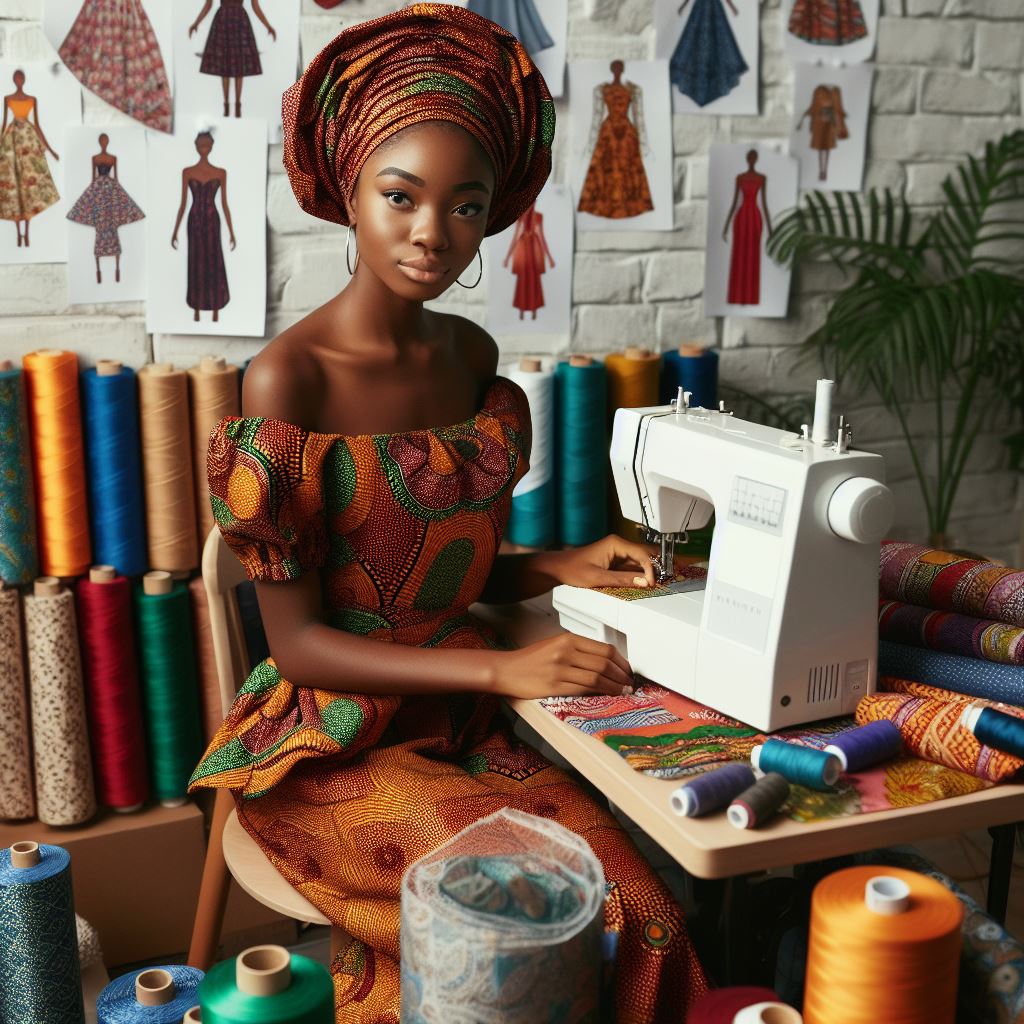Introduction
Welcome to the vibrant world of fashion in Nigeria, where creativity meets culture and innovation thrives.
Nigeria’s fashion scene is a tapestry of diversity, blending traditional craftsmanship with contemporary trends to create unique sartorial expressions.
From the bustling markets of Lagos to the colorful streets of Abuja, fashion permeates every aspect of Nigerian life, reflecting the country’s rich cultural heritage and dynamic spirit.
But beyond its aesthetic allure, the fashion industry plays a pivotal role in driving economic growth and social development in Nigeria.
Starting a successful fashion brand in Nigeria isn’t just about creating stylish clothing; it’s about harnessing the power of entrepreneurship to make a meaningful impact.
A successful fashion brand has the potential to create jobs, empower local artisans, and showcase Nigeria’s creativity and ingenuity on the global stage.
In this section, we’ll delve deep into the intricacies of starting a fashion brand in Nigeria, exploring the essential steps, challenges, and opportunities awaiting aspiring fashion entrepreneurs in this dynamic and ever-evolving industry.
Market Research
Conducting Market Research to Identify Target Audience and Competitors
Before diving into the world of fashion entrepreneurship in Nigeria, conducting comprehensive market research is paramount. This entails delving deep into understanding your potential customers and the competitive landscape.
Identifying your target audience is the first step. Who are they? What are their demographics, interests, and preferences? Understanding these aspects enables you to tailor your products, branding, and marketing strategies to resonate with your intended market segment.
Simultaneously, researching your competitors is essential. Who else is operating in the Nigerian fashion space? What are their strengths, weaknesses, and market positioning? Analyzing your competitors helps you identify opportunities for differentiation and areas where you can carve out your niche.
Understanding Consumer Preferences and Trends in the Nigerian Fashion Market
In Nigeria’s vibrant fashion scene, consumer preferences and trends are ever-evolving. To stay ahead of the curve, you must keep your finger on the pulse of the market.
Consumer preferences encompass a wide range of factors, including style preferences, price sensitivity, and shopping habits. By understanding what drives consumer decision-making, you can tailor your product offerings and marketing strategies to meet their needs effectively.
Moreover, staying abreast of trends is crucial. From fashion styles and colors to fabrics and design aesthetics, trends shape consumer demand and purchasing behavior.
Whether it’s the resurgence of traditional Nigerian prints or the popularity of sustainable fashion, aligning your brand with prevailing trends can enhance your appeal to the target audience.
To gather insights into consumer preferences and trends, utilize a mix of research methods. Surveys, focus groups, social media listening, and trend forecasting are valuable tools for uncovering valuable insights.
Read: Language Arts Courses: What to Expect in Nigeria
Creating a Unique Brand Identity
- Developing a strong brand identity that reflects the essence of your fashion brand
- Establishing a brand voice and visual identity for consistency across all platforms
Creating a unique brand identity is essential for the success of your fashion brand in Nigeria. Your brand identity is what sets you apart from your competitors and helps your target audience recognize and remember your brand.
Here are some key steps to help you create a strong and distinctive brand identity
Define Your Brand Personality
Start by defining the personality of your brand. Consider the values, beliefs, and characteristics that you want your brand to embody. This will help you establish a clear direction for your brand identity and guide your branding decisions.
Conduct Market Research
Research your target audience and competitors to understand their preferences, behaviors, and perception of fashion brands. This will provide valuable insights that can help you tailor your brand identity to resonate with your audience and differentiate yourself from competitors.
Develop a Brand Story
Craft a compelling brand story that communicates the history, inspiration, and values behind your fashion brand. This narrative will form the foundation of your brand identity and help create an emotional connection with your audience.
Establish Brand Voice and Visual Identity
Create a consistent brand voice and visual identity that reflects your brand personality and resonates with your target audience. This includes choosing a color palette, typography, logo design, and tone of voice that are aligned with your brand values and message.
Ensure Consistency Across All Platforms
Consistency is key to building a strong brand identity. Ensure that your brand voice and visual identity are consistent across all platforms, including your website, social media, marketing materials, and packaging.
This will help reinforce brand recognition and create a cohesive brand experience for your audience.
By following these steps and investing time and effort into developing a unique brand identity, you can establish a strong foundation for your fashion brand in Nigeria and set yourself up for success in the competitive fashion industry.
Read: Internship Opportunities for Communication Arts Students
Designing and Producing Quality Products
Investing in High-Quality Materials and Skilled Craftsmanship
For aspiring fashion entrepreneurs in Nigeria, investing in high-quality materials and skilled craftsmanship is not just a choice; it’s a necessity for building a successful brand.
Quality materials serve as the foundation of any garment or accessory. They ensure durability, longevity, and overall product satisfaction. When customers invest in your brand, they expect value for their money, and quality materials are key to delivering on that promise.
Moreover, using premium materials elevates the aesthetic appeal of your products. Whether it’s luxurious fabrics for clothing or durable hardware for accessories, quality materials add a touch of sophistication and exclusivity to your designs.
In a market saturated with options, this differentiation can be the deciding factor for customers choosing your brand over others.
Equally important is skilled craftsmanship. While quality materials lay the groundwork, skilled artisans bring your designs to life with precision and attention to detail.
From pattern making to stitching, every aspect of production requires expertise to ensure the final product meets your standards of excellence.
When you invest in skilled craftsmanship, you’re not just paying for labor; you’re investing in the integrity of your brand. Craftsmanship reflects your commitment to delivering superior products, earning you trust and loyalty from discerning customers.
Ensuring That Products Meet Industry Standards and Customer Expectations
In Nigeria’s thriving fashion industry, meeting industry standards and exceeding customer expectations are non-negotiables for success.
Adhering to industry standards is essential for maintaining credibility and competitiveness. Whether it’s sizing, labeling, or ethical production practices, compliance with industry norms ensures your brand’s legitimacy and reliability.
Beyond meeting standards, exceeding customer expectations is the hallmark of a truly exceptional brand. It requires a deep understanding of your target audience, their preferences, and their pain points.
By consistently delivering products that go above and beyond what customers anticipate, you foster loyalty and advocacy, turning one-time buyers into lifelong brand ambassadors.
To achieve this, it’s crucial to prioritize quality control measures and seek continuous feedback from customers. Regular quality checks throughout the production process help identify and rectify any issues before products reach the market.
Meanwhile, customer feedback provides invaluable insights into areas for improvement and innovation.
Ultimately, the combination of high-quality materials, skilled craftsmanship, adherence to industry standards, and customer-centricity forms the foundation of a successful fashion brand in Nigeria.
By investing in these pillars, you not only create exceptional products but also cultivate a loyal customer base that propels your brand to new heights of success.
Read: Impact of Communication Arts on Nigerian Media

Building an Online Presence
- Setting up a professional website and online store for your fashion brand
- Utilizing social media platforms to showcase products and engage with customers
Having a strong online presence is crucial for the success of your fashion brand in Nigeria. With the rise of e-commerce and social media, reaching your target audience and growing your brand has never been easier.
Here are some essential steps to take when building an online presence for your fashion brand
Setting up a Professional Website
Your website is your online storefront, so it’s essential to make a good impression. Invest in a professional website design that reflects your brand’s identity and aesthetics.
Make sure your website is user-friendly, visually appealing, and mobile-responsive. Include high-quality images of your products, detailed product descriptions, pricing information, and easy navigation.
Make the checkout process seamless to encourage purchases. Consider offering secure payment options and fast shipping to enhance the customer experience.
Creating an Online Store
In addition to having a professional website, consider setting up an online store where customers can easily browse and purchase your products.
Platforms like Shopify, WooCommerce, or Etsy are popular choices for creating online stores. Make sure to optimize your store for search engines by using relevant keywords and engaging product descriptions.
Provide multiple payment options, including local payment methods popular in Nigeria. Offer discounts, promotions, and loyalty programs to encourage repeat purchases.
Utilizing Social Media Platforms
Social media is a powerful tool for showcasing your products and engaging with customers. Create accounts on popular platforms like Instagram, Facebook, Twitter, and Pinterest.
Share visually appealing images and videos of your products to attract attention. Use hashtags relevant to the Nigerian fashion scene to reach a wider audience.
Engage with your followers by responding to comments, messages, and inquiries promptly. Collaborate with influencers and bloggers to promote your brand and attract new customers.
Engaging with Customers
Building relationships with your customers is key to building brand loyalty and trust. Encourage customers to leave reviews and testimonials on your website and social media accounts.
Offer exceptional customer service by addressing concerns and resolving issues promptly. Collect feedback from customers to improve your products and services.
Consider running contests, giveaways, and exclusive promotions to keep your customers engaged and excited about your brand.
By following these steps and actively engaging with your audience online, you can effectively build a strong online presence for your fashion brand in Nigeria.
Read: Communication Arts: Job Prospects and Salaries
Marketing and Promotions
- Developing a marketing strategy to reach a larger audience and drive sales
- Collaborating with influencers, fashion bloggers, and media outlets to promote your brand
Marketing and promotions are essential components of building a successful fashion brand in Nigeria. To ensure that your brand reaches a larger audience and drives sales, you need to develop a comprehensive marketing strategy.
Here are some key steps to effectively market and promote your fashion brand:
Know Your Target Audience
It is crucial to understand who your target audience is and what appeals to them. Conduct market research to identify their preferences, tastes, and shopping habits. This will help you tailor your marketing efforts to attract and retain customers.
Develop a Strong Brand Identity
Your brand identity is what sets you apart from competitors. Define your brand’s unique selling proposition (USP) and create a distinct visual identity, including a logo, color scheme, and brand voice. Consistency is key to building brand recognition and loyalty.
Utilize Social Media
Social media platforms such as Instagram, Facebook, and Twitter are powerful tools for promoting your fashion brand. Create engaging content, collaborate with influencers, and use targeted advertising to reach your target audience.
Regularly post high-quality images of your products to showcase your brand’s aesthetics and attract followers.
Transform Your Career with Expert Guidance
Get personalized mentorship consulting that’s tailored to your unique path. Our expert advice is actionable and exclusive.
Get StartedCollaborate with Influencers and Fashion Bloggers
Influencers and fashion bloggers have a strong influence on consumers’ purchasing decisions. Partner with popular personalities in the fashion industry to endorse your brand and reach a broader audience.
Consider hosting events, giveaways, or collaborations to generate buzz and attract new customers.
Engage with Media Outlets
Press coverage can significantly boost your brand’s visibility and credibility. Reach out to fashion magazines, online publications, and bloggers to feature your brand in their content.
Offer exclusive interviews, behind-the-scenes access, or product reviews to showcase your brand’s story and values.
Participate in Fashion Events and Shows
Attending fashion events, trade shows, and pop-up markets is an excellent way to network with industry professionals, connect with customers, and showcase your latest collections.
Consider sponsoring or participating in fashion weeks, exhibitions, or runway shows to gain exposure and build relationships with potential buyers and partners.
By implementing these marketing and promotion strategies, you can effectively build brand awareness, attract customers, and increase sales for your fashion brand in Nigeria.
Stay consistent, monitor your results, and adapt your marketing efforts based on feedback to ensure long-term success.
Discover More: Admission Requirements for Mass Communication in Nigeria
Uncover the Details: African Diaspora Studies within Nigerian Universities
Learn More: Benefits of Learning European Languages in Nigeria
Find Out More: Arabic Literature Courses in Nigerian Universities
Uncover the Details: Anthropology and Nigeria’s Rich Cultural Heritage
Customer Service and Feedback
Providing excellent customer service is crucial in building brand loyalty and trust. Customers are more likely to purchase from a brand that values their experience and provides exceptional service. Here are some key strategies to implement:
Train Your Staff
Ensure that your staff is well-trained in customer service skills. They should be friendly, attentive, and knowledgeable about your products. Encourage them to go above and beyond to assist customers and address any issues promptly.
Build Relationships
Focus on building relationships with your customers. Make them feel valued and appreciated by offering personalized services and incentives. Engage with them on social media and respond to inquiries and feedback in a timely manner.
Implement Feedback Mechanisms
Collecting feedback from customers is essential for improving your products and services. Implement mechanisms such as surveys, reviews, and feedback forms to gather valuable insights. Use this feedback to make informed decisions and enhance the overall customer experience.
Resolve Issues Promptly
If a customer has a complaint or issue, address it promptly and effectively. Apologize for any inconvenience caused and offer a solution that exceeds their expectations. Show customers that their satisfaction is your top priority.
Provide Consistent Communication
Stay in touch with your customers through regular communication. Keep them informed about new products, promotions, and events. Send personalized messages and updates to show that you value their continued support.
Be Transparent and Honest
Transparency is key in building trust with your customers. Be honest about your products, pricing, and policies. If there are any issues or changes, communicate openly with your customers to maintain their trust and loyalty.
Monitor and Measure Performance
Monitor your customer service performance regularly and measure key metrics such as response time, satisfaction levels, and resolution rates. Use this data to identify areas for improvement and implement strategies to enhance the overall customer experience.
By prioritizing customer service and feedback, you can build a successful fashion brand in Nigeria that resonates with your target audience and fosters long-term relationships with your customers.
Discover More: How Chinese Studies Enhances Global Career Prospects
Conclusion
In closing, venturing into the realm of fashion entrepreneurship in Nigeria demands strategic foresight and unwavering perseverance.
Recapping the salient points discussed, it’s evident that starting a successful fashion brand necessitates a multifaceted approach.
Thorough market research serves as the cornerstone of your journey, providing invaluable insights into consumer behavior and market dynamics.
Prioritizing quality in your products and services sets the foundation for building trust and loyalty among your clientele.
Innovation and differentiation are imperative for standing out amidst fierce competition, while staying attuned to emerging trends ensures relevance and adaptability.
To aspiring fashion entrepreneurs, I offer words of encouragement.
Your dreams are valid, and your vision is worth pursuing.
Embrace challenges as opportunities for growth, and let your passion propel you forward, even in the face of adversity.
In the dynamic landscape of the Nigerian fashion industry, there’s ample room for creativity, innovation, and entrepreneurship.
Forge ahead with determination, resilience, and a relentless pursuit of excellence, knowing that your contribution can leave an indelible mark on this vibrant and ever-evolving industry.




